An infectious disease is any disease that spreads between people, or from animals and insects to people.
Bacteria and viruses (germs) that cause diseases can spread between people in many ways.
Some ways germs spread are:
- Direct skin to skin contact
- Through the air (when someone coughs or sneezes, for example)
- Through water or food
- Sexual contact
- Contact with bodily fluids like blood
As more people travel between communities, across Canada, and around the world, the spread of infectious diseases can be more common. Some diseases are minor and some can be serious, especially for older or younger people, or those with a weaker immune system.
Examples of infectious diseases in Nunavut and Canada are influenza (the flu), Hepatitis B, whooping cough (pertussis), and tuberculosis (TB).
Find out information on a few examples of infectious diseases by clicking the menu:
If you have questions about another disease, talk to your health care provider.



